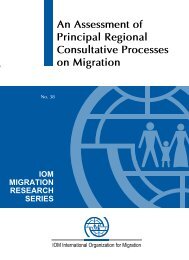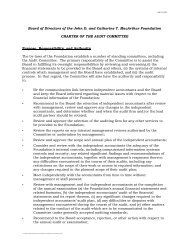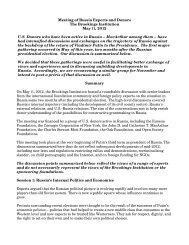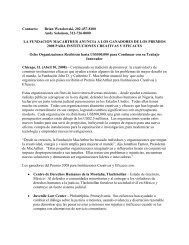A Global Compact on Learning - Brookings Institution
A Global Compact on Learning - Brookings Institution
A Global Compact on Learning - Brookings Institution
You also want an ePaper? Increase the reach of your titles
YUMPU automatically turns print PDFs into web optimized ePapers that Google loves.
OVERVIEW<br />
The main arguments presented in this report are<br />
summarized in the overview and explored in much<br />
more depth in the chapters that follow. Together<br />
these arguments present a powerful rati<strong>on</strong>ale for redoubling<br />
our efforts in educati<strong>on</strong>, meeting the educati<strong>on</strong><br />
Millennium Development Goals, and most<br />
importantly, shifting the global educati<strong>on</strong> paradigm<br />
toward the goal of learning for all as the new minimum<br />
threshold to which the internati<strong>on</strong>al community<br />
must aspire. A <str<strong>on</strong>g>Global</str<strong>on</strong>g> <str<strong>on</strong>g>Compact</str<strong>on</strong>g> <strong>on</strong> <strong>Learning</strong><br />
would provide both a broad framework and a series<br />
of c<strong>on</strong>crete steps for achieving this visi<strong>on</strong>.<br />
There is a global learning crisis, which is hitting the<br />
poorest, most marginalized children and youth<br />
particularly hard. Driven by the Educati<strong>on</strong> for All<br />
(EFA) movement and the Millennium Development<br />
Goals (MDGs), significant progress has been<br />
made during the last two decades in getting milli<strong>on</strong>s<br />
more children into school, ensuring that they stay<br />
in school, and narrowing the gender gap in enrollment.<br />
Progress, however, has been highly uneven<br />
within and across countries, and too many children<br />
still drop out before completing primary school—a<br />
waste of human potential and investment. Furthermore,<br />
going to school has not necessarily translated<br />
into learning in school. For example, in some Sub-<br />
Saharan Africa countries, children with five years of<br />
educati<strong>on</strong> had a 40 percent chance of being illiterate.<br />
The severity of the learning crisis is even more<br />
striking when we c<strong>on</strong>sider that “the average child in<br />
a poor country learns less than about 95 out of 100<br />
children in rich countries.” 18 The latest data reveal a<br />
learning crisis around the world that risks reversing<br />
significant gains in access to learning—and indeed<br />
in improving lives—in many countries.<br />
This learning crisis has three dimensi<strong>on</strong>s. First,<br />
milli<strong>on</strong>s of children and youth still lack access to<br />
learning opportunities. Some never enter a classroom<br />
and others start school but drop out before<br />
they can finish. Most often, children who live in<br />
poverty are the most educati<strong>on</strong>ally marginalized.<br />
Sec<strong>on</strong>d, those who are in school often do not acquire<br />
the foundati<strong>on</strong>al skills—including literacy and<br />
numeracy—that would enable them to successfully<br />
c<strong>on</strong>tinue in school. Moving from learning to read to<br />
reading to learn is a crucial transiti<strong>on</strong> that educati<strong>on</strong><br />
systems are failing to help milli<strong>on</strong>s of children to<br />
make. Third, few children make it bey<strong>on</strong>d primary<br />
school with sec<strong>on</strong>dary educati<strong>on</strong> largely benefiting<br />
the wealthiest 20 percent of the populati<strong>on</strong>. Flexible<br />
post-primary educati<strong>on</strong> opti<strong>on</strong>s, including formal<br />
sec<strong>on</strong>dary school, are both in limited supply and often<br />
focus <strong>on</strong> developing young people’s knowledge<br />
and skills in areas that are neither needed in their<br />
daily lives nor appropriate for preparing them for<br />
the world of work.<br />
“<strong>Learning</strong> for all” should be the new goal driving<br />
the global educati<strong>on</strong> agenda. The most recent data<br />
<strong>on</strong> educati<strong>on</strong>, particularly in low-income countries,<br />
show that quality and equity are the major challenges.<br />
The right of every child to a high-quality educati<strong>on</strong><br />
is affirmed in numerous human rights treaties<br />
and recognized by governments, as exemplified<br />
in the six EFA goals adopted by 164 nati<strong>on</strong>s eleven<br />
years ago in Dakar. Although access to both formal<br />
and n<strong>on</strong>-formal learning opportunities is essential,<br />
evidence around the world has shown that it is not<br />
sufficient to meet the actual goal of educati<strong>on</strong>—that<br />
every girl and boy should make the transiti<strong>on</strong> to<br />
adulthood equipped with the skills, knowledge, and<br />
A <str<strong>on</strong>g>Global</str<strong>on</strong>g> Compa c t <strong>on</strong> <strong>Learning</strong>: Taking Acti<strong>on</strong> <strong>on</strong> Educat i o n in Developing Countries<br />
C e n t e r for Universal Educat i o n at <strong>Brookings</strong><br />
5






